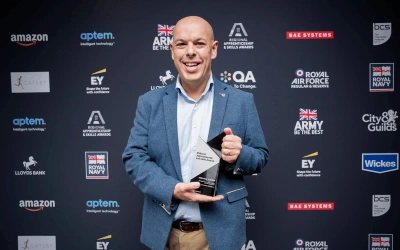Earlier this year, Lorien were delighted to partner with MAMA.codes to bring their coding clubs to children from the Grenfell community. We held our first sponsored hackathon shortly before retreating to our own homes. Lockdown has changed MAMA.codes plans overnight but they have quickly pivoted to be able to continue bringing coding clubs to young people online. We sat down (virtually of course!) with co-founder, Liane Katz to find out more about the MAMA.codes story and what the future holds.
Tell us a bit about MAMA.codes and what you do?
MAMA.codes is a parent-powered coding school for children aged 3-11. We're on a mission to redefine coding education, taking the fear and complexity out, and putting fun and creativity in.
By teaching coding as a language, from as young as age three, we make digital literacy accessible and strive for a more diverse tech industry.
We run a busy programme of code clubs and holiday camps, usually in schools, nurseries, community venues and private homes, now operating entirely online under lockdown.
In addition to our commercially run classes, we offer a range of outreach sessions, working with partner schools and a North Kensington charity, Nova New Opportunities. With support from Lorien, we ran our first hackathon with families from the Grenfell community and are continuing courses of free classes there through 2020. We’ve couriered over a set of iPads to enable learning to continue during lockdown.
How did the idea come about?
I had spent 12 years at the Guardian in various digital roles (Content, Product Management, Mobile) and had seen first-hand that fluency in software development was an increasingly core career skill in a wide range of industries - including digital journalism.
I learned my first code in my 30s, thanks to informal lessons with some developer colleagues and realised that my skills as a languages graduate were actually really transferable to programming, and that I didn't need a PhD in Maths to access these 21st century 'superpower' skills.
As a parent of two, then aged six and three, I was clear I wanted my kids to learn to code young, especially my daughter. I was aware that coding had been added to the English primary school curriculum from age five in 2014. However, teaching coding to a child in early primary or preschool is a very different kettle of fish to teaching adults or teens! Even those of us working in tech wouldn't know where to start.
You have to fire up their imagination and give them a really concrete practical motivation for learning to code THEIR idea to turn out just how they imagine it. Offering a series of prescriptive 'puzzles' can cause a creative or independent-minded child to switch off.
I believe children need agency when they learn to code: the opportunity to make choices then code their vision and bring it to life. This theme of empowerment flows through all our products and experiences.
Coding, specifically, was added to the primary curriculum for schools in England in 2014 from Year 1 upwards. It's now encouraging to see that children who have learned coding at school from age five tend to view coding as a gender blind activity.
Why is it so important to build these digital literacy skills early?
Children under the age of eight are like sponges for absorbing language patterns, so if we teach coding as a language at this formative age, it becomes a natural part of the digital competence they are developing. With icon-based coding languages such as ScratchJr, even pre-reading children can start to learn to code. Preschoolers are incredibly logical and are also less afraid to try and fail than older children - or certainly adults!
Traditionally children have only started to learn to code at 11, or in more recent years at seven, when most children have developed secure reading skills. We believe children are cognitively ready to take on the core logic and computational thinking from three, so why not give them a head start? We are undertaking efficacy research as part of the UCL/Institute of Education 'Educate' programme - watch this space!
Give us an example of some typical activities that take place in one of your coding classes?
Our youngest digital whizzkids are aged just 3-5 when they join our 'Sing & Code' lessons. These focus on offline, physical coding and combine nursery rhymes and movement, props and flashcards to re-enforce key concepts such as 'a command'. One week they might code a farmyard, another a rocket blasting into space!
Ready for more complexity and longer sequences of commands, our 5-7 year olds move on to coding with tablet-based ScratchJr. Our curriculum is super creative and will spark the children's imaginations to create interactive animations full of design thinking, creativity and humour.
Having achieved their Bronze, Silver and Gold Challenge Awards, at age 7-8 they move on to the more advanced Scratch coding language. It's still block-based but contains text and many more command blocks to play with. Our 'Generation Code' students often create complex games and adventure stories in code!
How has Covid 19 affected the business?
At first it was rather an existential threat - there was talk of school and community venue closures during spring term which would prevent us delivering some classes in March. How long schools would remain closed was unclear and parent confidence was shifting rapidly away from exposing their children to unnecessary risk. We took the difficult decision to withdraw from schools and cancel our Easter workshops and focus entirely on online class delivery.
We had been trialling virtual classes for some months and were well placed to pivot. In a week, we had trained our team of licensees, tutors and teaching assistants, selected our preferred online classroom tools and were starting to book in free trials of the new format.
We've now welcomed over 400 students into our online classes from Hawaii to the Philippines.
The challenge now is to deal with 'zoom fatigue' amongst families and ongoing uncertainty about the safety of physical classes and school and nursery re-openings.
We are focusing on building international traction and are building our own learn to code app - "Looparoo" - which will support both families and schools with innovative integrated curriculum materials and a coding interface.
We have also developed a low-cost, Facebook-based club for families. The Looparoo STEAM Club is a busy hub for fun, simple and engaging activities that cover STEM plus arts, tech wind down tips for managing increased screen use and regular live coding taster sessions.
What can businesses do to help the next generation into tech?
We have to keep STEM and computing learning fun, creative and inspiring - when delivered in this way, children can't help but be captivated.
Role modelling diversity and inclusivity is hugely important too, especially to help children and teens feel the industry is accessible to people like them. Young people need to see that by learning digital and computing skills, they are opening up a wealth of opportunities for well-paid, fulfilling and secure employment, as well as valuable life skills such as keeping their personal data secure and being a good digital citizen.
Tech should be presented as a means to an end to achieve and realise all the amazing ideas and projects young people have in their minds. Teaching innovation and entrepreneurship need to go hand in hand with computing to equip the next generation of digital disruptors.







